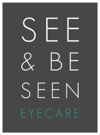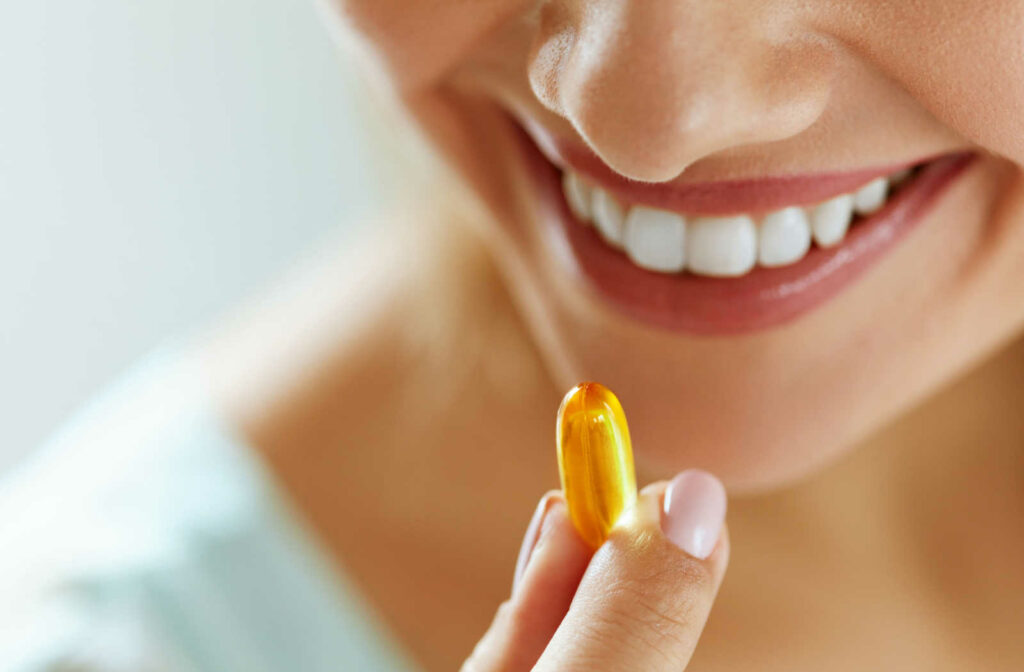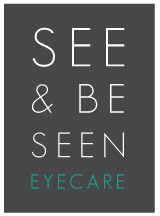Dry eye disease is a common condition that affects millions of people worldwide. If you’re struggling with dry eye disease, you’re not alone. Thankfully, there are a variety of effective treatments, including at-home and in-office options.
Changing your lifestyle and incorporating healthy foods rich in vitamins and nutrients may be effective in reducing or alleviating dry eye symptoms. Some of the best supplements for dry eyes include omega-3 fatty acids, and vitamins D, A, and C. These nutrients can be incorporated into your daily routine through your diet or as supplements.
While supplements may help you find relief, we recommend consulting your eye doctor for advice on a comprehensive approach to dry eye treatment tailored to your eyes and health.
What Causes Dry Eye?
Dry eye disease happens when your eyes are unable to produce enough tears or the quality of the tears is inadequate, leading to dryness, irritation, and discomfort. Your tear film keeps your eyes lubricated, and when any layer of it is disrupted, this can lead to dry eye.
There are a variety of causes of dry eye, including:
- Aging
- Hormonal changes
- Windy, dry, or polluted air
- Screen time
- Vitamin deficiency
Vitamin Deficiency & Dry Eyes
Vitamin D plays an important role in maintaining healthy and functional eyes, and its deficiency can lead to a range of health problems, including dry eye disease. Low levels of vitamin D have been linked to a decrease in tear quality, quantity, and stability. Vitamin D deficiency may also put you at a higher risk for meibomian gland dysfunction (MGD), one of the most common causes of dry eye disease.
How Can I Treat Dry Eyes Naturally?
Many mild cases of dry eye can be effectively managed at home using natural remedies. These can include taking vitamins and supplements such as omega-3 fatty acids, which can reduce inflammation and improve tear production, and using cleansing towelettes to keep the eyelids clean. Warm compresses can also help promote healthy tear production and prevent further dryness.
Incorporating lifestyle changes like using a humidifier, wearing sunglasses to protect your eyes from wind and dust, and taking frequent eye breaks during extended screen time can also be beneficial.
These at-home remedies and lifestyle changes can provide a convenient way to treat dry eye, however, it’s important to consult with an eye doctor for a proper diagnosis to make sure treatments are appropriate for your particular condition.
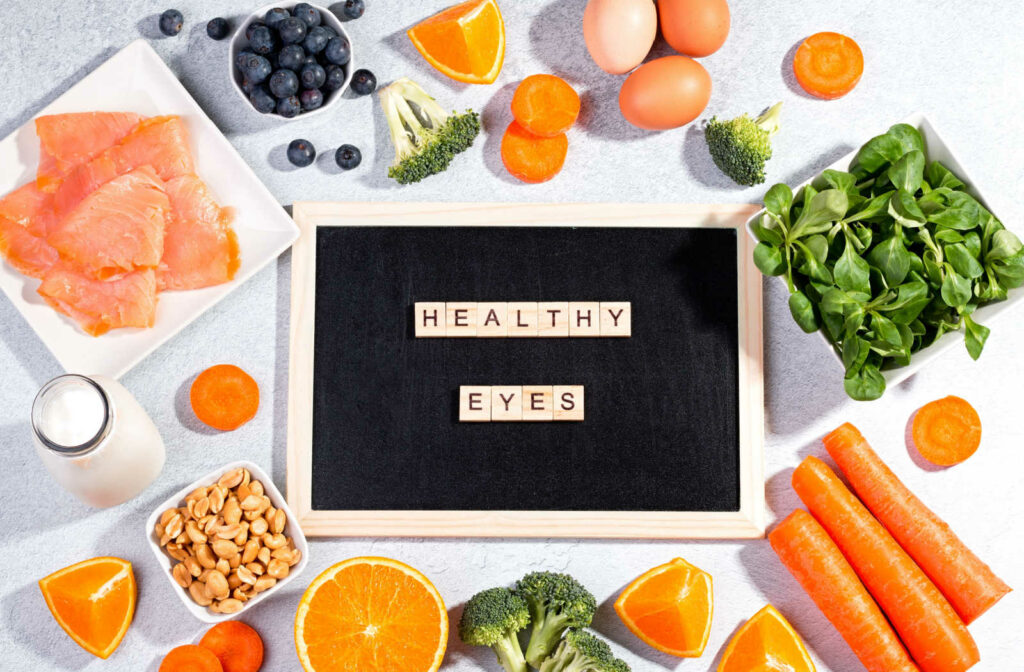
Supplements for Dry Eye
When it comes to vitamins and supplements for dry eyes, there are many options available that can provide dual benefits for both eyes and overall health. Check in with your doctor to find out how you can safely incorporate supplements into your diet. They can also help you select reliable, quality products, such as Physician Recommended Nutriceuticals (PRNs).
Omega-3
Omega-3 fatty acids are essential for health and have been shown to help relieve dry eye symptoms. Not all omega-3 supplements you find off the counter may be effective, it is important to find the right supplement that can help with dry eye. You can also choose quality options like PRN Omega Fish Oil to get the most out of your supplements and help your body absorb their beneficial nutrients. You can also go an extra mile and add more omega-3 to your diet through foods like salmon, mackerel, flaxseed, and walnuts!
Vitamin D
Vitamin D plays an important role in supporting healthy eyes and may help with managing dry eye symptoms. A quality supplement of vitamin D may be able to make dry eye treatments such as eye drops more effective. Natural sources of vitamin D include spending time outdoors in the sun (don’t forget your sunglasses!) or consuming foods such as fish, eggs, mushrooms, and fortified dairy products.
Vitamin A
Vitamin A has been shown to help manage dry eyes by increasing the turnover rate of corneal epithelial cells. When these cells are lost or damaged due to dry eye symptoms, supplementing with vitamin A can be beneficial in replenishing and restoring them. Natural sources of vitamin A include carrots, sweet potatoes, cantaloupe, fish, eggs, spinach, and kale.
Vitamin C
Vitamin C is an essential antioxidant that has been shown to help reduce the symptoms of dry eyes. It helps combat oxidative damage and inflammation of the eyes. Additionally, vitamin C may be beneficial in helping eyes heal from corneal wounds. Vitamin C is a popular supplement, and natural sources include citrus fruits, tomatoes, bell peppers, kale, strawberries, and broccoli.
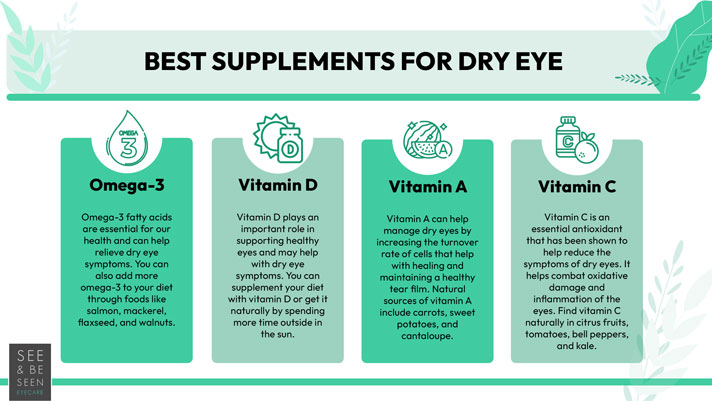
Other Options for Dry Eye Relief
In order to get relief from the long-term effects of dry eye, it’s important to receive professional treatment from your eye doctor. They can provide customized care, including advice on how to safely and effectively incorporate supplements and at-home treatments.
Many innovative technologies can help you find long-term, effective relief from dry eyes. These include LipiFlow, which uses heat and gentle pressure to restore oil production in the eyes, and BlephEx, a form of gentle exfoliation that removes debris built up around the eyelids and lashes. Scleral contact lenses can also provide a barrier between the eye and the external environment to help you maintain lubrication and comfort.
Find Relief with Personalized Dry Eye Care
Natural remedies like supplements can be effective for dry eyes in the short term. However, at See & Be Seen Eyecare, we believe in long-term solutions that provide complete comfort and relief from dry eye symptoms. We understand that everyone’s eye health is unique. Our team takes the time to understand your individual situation and offers personalized care and treatments based on your needs for optimal comfort, functional vision, and an outcome you feel good about. Contact us today to book a dry eye consultation.

